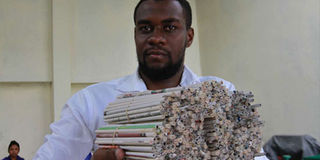Meet duo on mission to save forests, one pencil at a time

Mo&Mo Group Company's production manager Anwar Ahmed displays pencils made from recycled newspapers at their Machakos-based firm on October 23, 2019. PHOTO | PIUS MAUNDU | NATION MEDIA GROUP
What you need to know:
- The two are founders of Mo&Mo Group Company, which locally produces pencils from recycled newspapers.
- The company has been donating the pencils to primary school pupils.
Every year, Kenya imports about 150 million wooden pencils to meet the demand in the country.
None of the pencils used by Kenyans is manufactured locally. About six acres of trees are cut down every minute globally to supply the timber needed to make about 14 billion pencils that are produced annually.
If these trees were to be cut in the Mau Forest at that rate, it would only take 78 days for the largest indigenous montane forest in East Africa to be cleared. All for a pencil.
Upon stumbling across these shocking statistics, Mr Mahamud Omari and Mr Fadhil Mohamed decided to take action.
Coupled with a desire to make a difference in the lives of learners, create jobs and at the same time do their bit to ensure that Kenya does not end up a desert, the two decided to act.
The two are founders of a start-up company called Mo&Mo Group Company launched in July 2018. The company locally produces pencils from recycled newspapers.
SUSTAINABLE DEVELOPMENT
Mr Mahamud Omari, a film producer and the company’s CEO, and Mr Fadhil Mohamed, an interior designer and the company’s chief brand officer, are the driving force behind the start-up.
“We had done what was to be done in our careers. At the time, the question that was driving us was what contribution could we make towards ensuring the next generation is better off than us,” he says.
It was Mr Mohamed who suggested that they manufacture pencils from recycled newspapers. He had seen the idea implemented in China and India as an alternative to wooden pencils.
“A pencil, simple as it may seem, is a powerful tool. For a majority, it was what marked our start in learning how to write and draw … However, in the quest of growing our creativity, we constantly bleed the planet and destroy its lungs. That doesn’t have to be the case,” Mr Mohamed says.
With limited funds, they contracted a university student to do the market research to determine the idea’s feasibility. The two then travelled to China to purchase the machinery needed.
POOR PUPILS
After purchasing an acre of land in Mavoko, setting up a production plant and training its 15 full-time employees, the journey began.
“The process of making pencils starts with us buying old newspapers from youth groups. The newspapers are then cut to size, glued together and the lead inserted. After that, we roll the newspapers, dry them in ovens and finally insert the pencils in films,” Mr Omari says.
The company has been donating the pencils to pupils in primary schools, especially in disadvantaged communities.
To popularise the conservation mentality, each pupil is given a tree seedling to grow. “A few years to come, we will have students who are empowered and aware of the importance of taking care of their environment,” says Mr Omari.





